2022 Undergraduate Research Symposium at UCSB
CCDSP summer interns presented their work at a poster session.
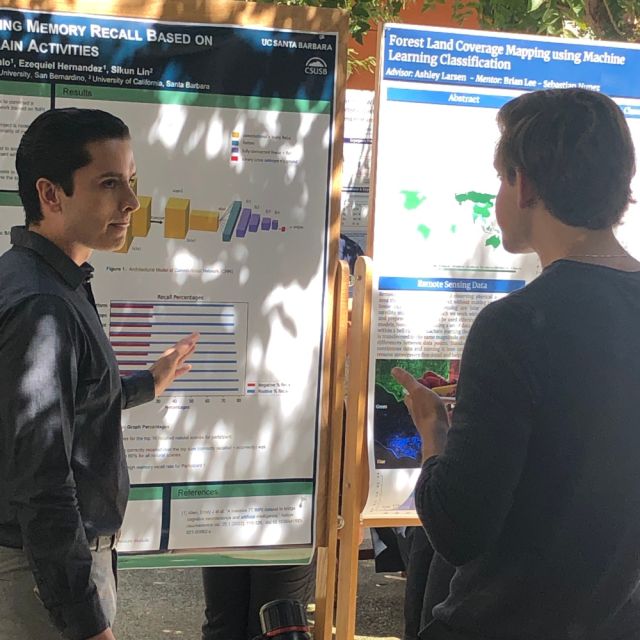
On Thursday, August 11, participants from the Central Coast Data Science Program's second cohort of summer fellows presented at the UCSB Summer Undergraduate Research Symposium, a poster session displaying the breadth of undergraduate research from across campus. There were 64 posters representing 12 different undergraduate programs.
CCDSP's summer cohort included three students from Cal State San Bernardino and three students from Santa Barbara City College. These six students proudly shared the results of their work over the previous eight weeks.
The summer research experience ran from June 21 through August 12. Participants from CSUSB and SBCC received stipends from the National Science Foundation's HDR grant #1924205.
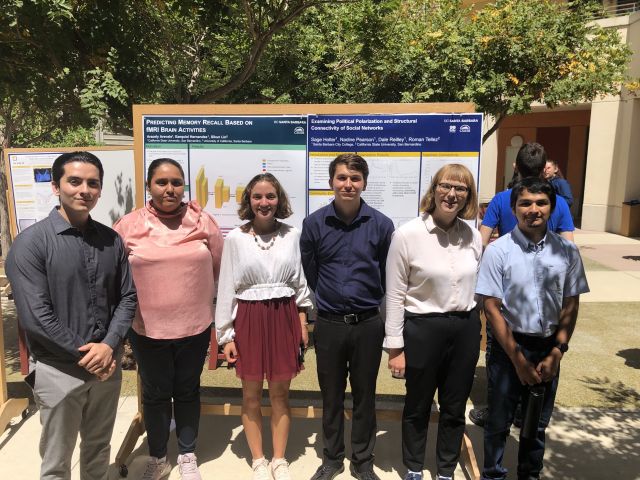
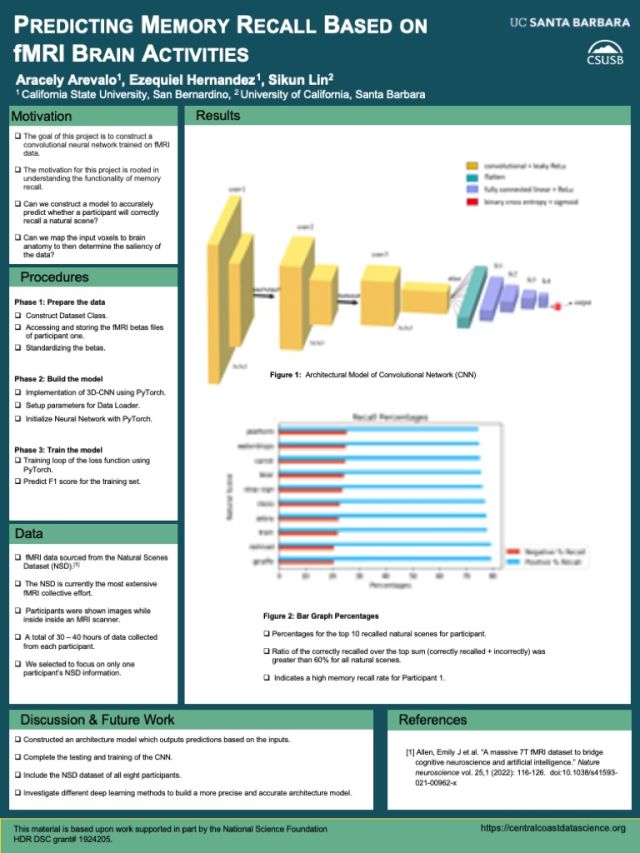
Predicting Memory Recall Based on fMRI Brain Activities
Participants
- Aracely Arevalo, CSU San Bernardino
- Ezequiel Hernandez, CSU San Bernardino
- Sikun Lin, UCSB Mentor
Abstract
This project seeks to construct a convoluted neural network (CNN) trained on fMRI betas obtained from the Natural Scenes Dataset (NSD) and reduced using the General Linear Model (GLM). The NSD includes fMRI measurements of eight healthy subjects taken while they viewed thousands of natural scenes. It is among the most comprehensive fMRI data sets ever collected and is therefore a prime source for training deep learning models. Using fMRI activity from a single participant from the NSD, we attempt to train the model to predict whether a participant would remember an image they had previously seen. We seek to optimize computation time and construct a saliency map that reflects the contribution of each input voxel. From each voxel, we can further investigate the functionalities and regions of the mapped brain areas. This in turn can provide insight into predicting brain activity and memory formation. Future work could include all eight NSD participants.
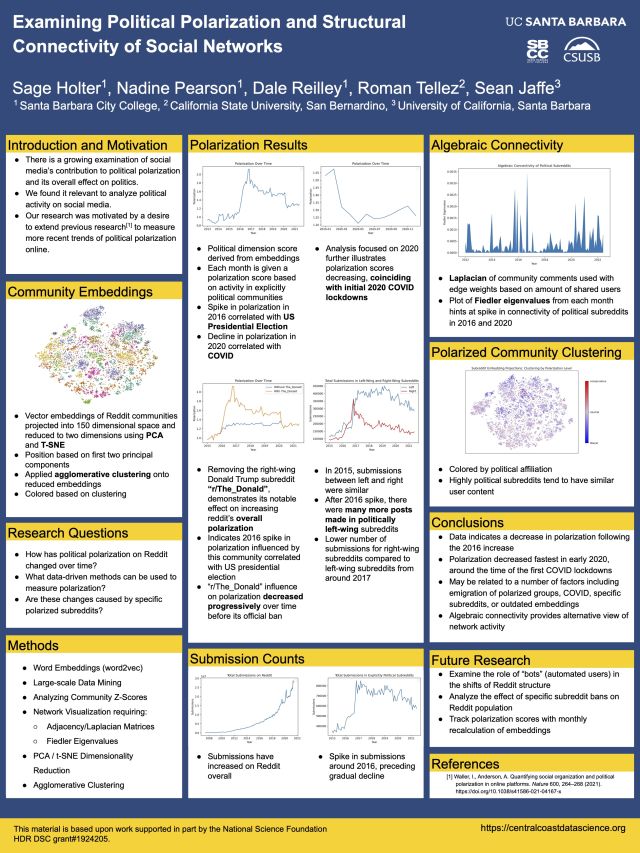
Examining Political Polarization and Structural Connectivity of Social Networks
Participants
- Sage Holter, Santa Barbara City College
- Nadine Pearson, Santa Barbara City College
- Dale Reilley, Santa Barbara City College
- Roman Tellez, CSU San Bernardino
- Sean Jaffe, UCSB Mentor
Abstract
As social media networks expand their influence, there is a growing examination of these sites’ contribution to political polarization. Previous research has indicated an increase in polarization on the website Reddit, largely driven by new users around the 2016 election. As the data examined extends only to 2018, there is interest to see current levels of polarization on this platform. Contrary to expectations, our analysis suggests that Reddit polarization has been decreasing since 2016, with a surprisingly large downturn coinciding with initial 2020 COVID lockdowns. We examine Reddit communities based on contextual embeddings and track changes over time. We also propose using a novel application of spectral analysis of Reddits overall network structure. Our results demonstrate the ability of contextual embeddings and structural information to create a macroscopic view of online networks.
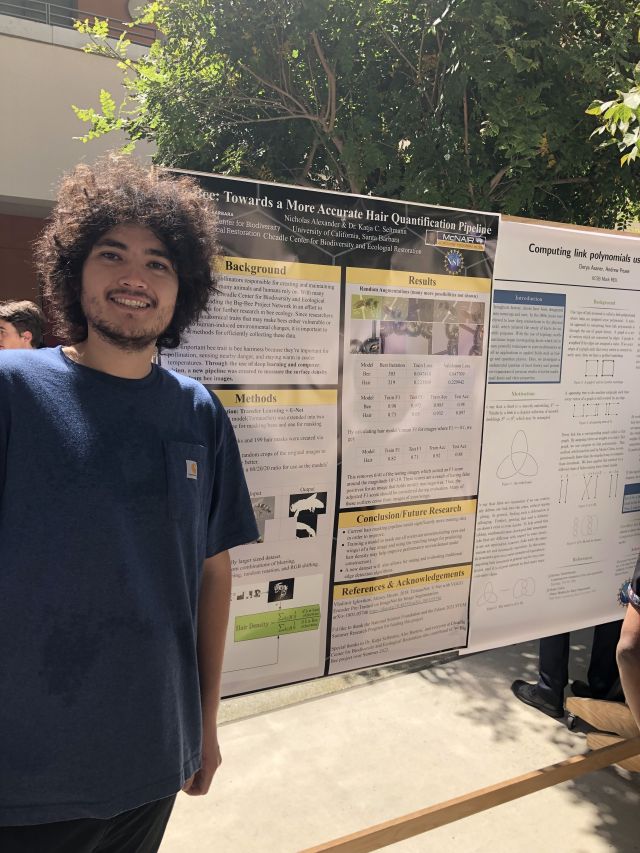
UCSB Data Science Fellow, Nicholas Alexander, was also among the presenters, as part of the Edison Summer Research Program. He was given the opportunity to continue the work begun on his capstone project earlier in the year: Big Bee: Hair Recognition & Quantification. We always enjoy hearing research updates, and Nicholas certainly enjoyed sharing the improvements made to the research sponsored by CCBER.
Congratulations to all the participants! We wish to extend a huge thank you to Sikun Lin and Sean Jaffe for all their mentorship. And thank you also to Dr. Samantha Davis at UCSB's Center for Science and Engineering Partnerships (CSEP) and all of the other program coordinators who helped make this event happen.